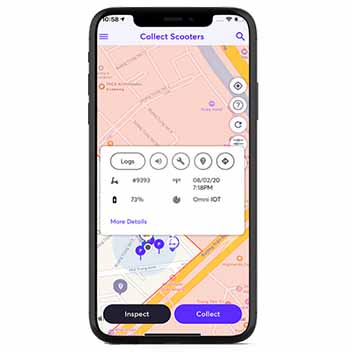
An Asia Pacific’s Leading IoT-Powered Micro-Mobility App
AWS / Cross Platform / iOS / IOT / Javascript / Mobile App Development / NodeJS / React Native / Rest API

Salt is a Python-based framework for large-scale infrastructure and application management automation. Functioning as an event-driven tool, it deploys, configures, and manages complex IT systems, ensuring consistent states . Recognized as a fast, intelligent, and scalable automation engine .
PowerGate’s SaltStack developer utilizes Salt’s modular architecture to engineer custom automation workflows, fine-grained configuration management, and remote execution solutions—optimizing infrastructure performance and operational efficiency.
Salt offers a wide array of features that make it ideal for managing diverse IT environments. These capabilities extend beyond basic automation and provide a robust platform for infrastructure management:
Configuration Management
Salt is a powerful configuration management system that maintains remote nodes in defined states. It ensures specific packages are installed and services are running. Salt manages OS deployment, software installation, and infrastructure components like servers, VMs, databases, and network devices. It prevents configuration drift and ensures consistency. Salt’s flexibility and broad compatibility make it ideal for managing diverse applications and systems across various operating systems and network devices.
Distributed Remote Execution
Salt is a distributed remote execution system for running commands and querying data on remote nodes. It allows targeted execution on individual or groups of nodes, leveraging parallel execution for efficiency. Salt offers granular control over system targeting based on properties, not just hostnames. Designed for speed, flexibility, and handling large-scale deployments, it provides a simple interface for managing hundreds or thousands of servers.
Automation and Orchestration of IT Processes
Beyond basic command execution, Salt can automate and orchestrate routine IT processes. This includes common required tasks for scheduled server downtimes or upgrading operating systems or applications. Salt can be used to create self-aware, self-healing systems that can automatically respond to outages, common administration problems, or other important events.
Scalability for Large Environments
Salt is designed with scalability in mind, capable of handling not just dozens but hundreds and even thousands of individual servers quickly through a simple and manageable interface. The architecture is designed to work with any number of servers, from small local networks to international deployments.
Simplicity of Setup and Maintenance
Despite its powerful capabilities, Salt is very simple to set up and maintain, regardless of the size of the project. The architecture follows a simple server/client model with the necessary functionality built into a single set of daemons. While the default configuration works with minimal modification, Salt can be fine-tuned for specific needs.
Flexibility and Extensibility
Salt is pluggable and customizable, allowing it to work well with many existing technologies. Its execution routines can be written as plain Python modules, allowing for simple expansion and customization of its functionality. Salt can be called from a simple Python API or the command line, making it suitable for both one-off commands and integration into larger applications.
Secure Communication
Security is integral to Salt, utilizing public keys for authentication with the master daemon and then using faster AES encryption for payload communication.
Speed and Efficiency
Salt leverages proven technologies like the ZeroMQ networking library for its networking layer, acting as a viable and transparent AMQ broker. It also uses msgpack for communication, enabling fast and light network traffic.
Client-server (Minion-Master)
Moderate (requires master setup)
Excellent (event-driven, high scale)
YAML, Jinja2 templates
Strong (event system, real-time push)
Good (active but smaller than Ansible)
System automation, orchestration
Agentless (SSH-based)
High (no agents, simple config)
Good (depends on SSH performance)
YAML (playbooks)
Limited (pull-based, slower)
Excellent (large community)
Simple automation, DevOps
Client-server (Agent-based)
Moderate (agent installation)
Excellent (enterprise-grade)
Puppet DSL (Ruby-based)
Moderate (scheduled pulls)
Good (enterprise-focused)
Complex infrastructure management
PowerGate’s experienced Saltstack developer team can provide a range of services to help businesses harness the full potential of this automation framework. These services can include:
Creating tailored automation scripts and modules to address specific infrastructure and application management requirements.
Assisting with the setup and configuration of Salt Master and Minion environments, ensuring scalability and security.
Developing end-to-end automation workflows for routine IT tasks, application deployments, and system updates.
Connecting Salt with other IT management tools and platforms to create a cohesive and automated environment.
Providing expert guidance on leveraging Salt effectively, optimizing configurations, and adhering to best practices for infrastructure automation.
From a simple concept in your mind, to a fully functional solution on your server and user’s desk
Boost your development team and accelerate delivery speed with PowerGate’s dedicated Saltstack developer team.
Remove your internal heavy cost with our product maintenance, QA, and DevOps teams